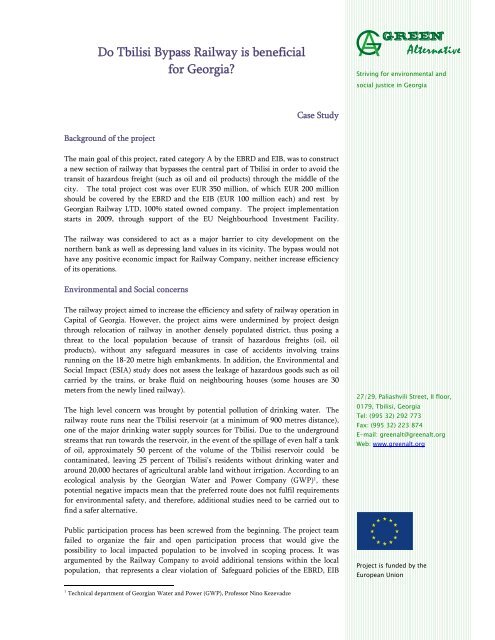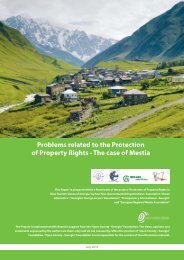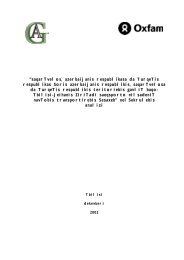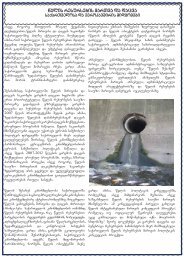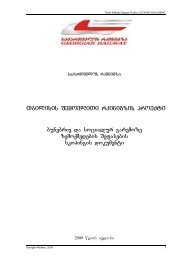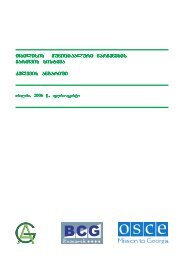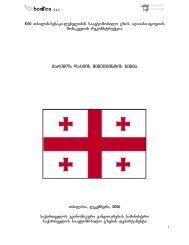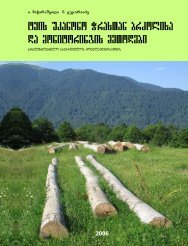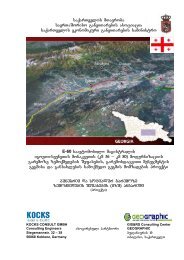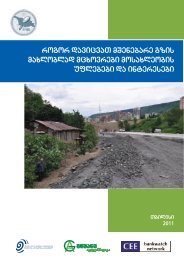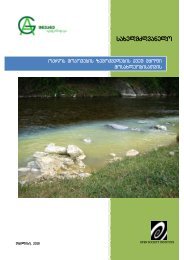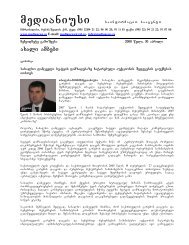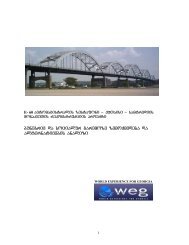Do Tbilisi Bypass Railway is beneficial for Georgia?
Do Tbilisi Bypass Railway is beneficial for Georgia?
Do Tbilisi Bypass Railway is beneficial for Georgia?
You also want an ePaper? Increase the reach of your titles
YUMPU automatically turns print PDFs into web optimized ePapers that Google loves.
<strong>Do</strong> <strong>Tbil<strong>is</strong>i</strong> <strong>Bypass</strong> <strong>Railway</strong> <strong>is</strong> <strong>beneficial</strong><br />
<strong>for</strong> <strong>Georgia</strong>?<br />
Striving <strong>for</strong> environmental and<br />
social justice in <strong>Georgia</strong><br />
Case Study<br />
Background of the project<br />
The main goal of th<strong>is</strong> project, rated category A by the EBRD and EIB, was to construct<br />
a new section of railway that bypasses the central part of <strong>Tbil<strong>is</strong>i</strong> in order to avoid the<br />
transit of hazardous freight (such as oil and oil products) through the middle of the<br />
city. The total project cost was over EUR 350 million, of which EUR 200 million<br />
should be covered by the EBRD and the EIB (EUR 100 million each) and rest by<br />
<strong>Georgia</strong>n <strong>Railway</strong> LTD, 100% stated owned company. The project implementation<br />
starts in 2009, through support of the EU Neighbourhood Investment Facility.<br />
The railway was considered to act as a major barrier to city development on the<br />
northern bank as well as depressing land values in its vicinity. The bypass would not<br />
have any positive economic impact <strong>for</strong> <strong>Railway</strong> Company, neither increase efficiency<br />
of its operations.<br />
Environmental and Social concerns<br />
The railway project aimed to increase the efficiency and safety of railway operation in<br />
Capital of <strong>Georgia</strong>. However, the project aims were undermined by project design<br />
through relocation of railway in another densely populated d<strong>is</strong>trict, thus posing a<br />
threat to the local population because of transit of hazardous freights (oil, oil<br />
products), without any safeguard measures in case of accidents involving trains<br />
running on the 18-20 metre high embankments. In addition, the Environmental and<br />
Social Impact (ESIA) study does not assess the leakage of hazardous goods such as oil<br />
carried by the trains, or brake fluid on neighbouring houses (some houses are 30<br />
meters from the newly lined railway).<br />
The high level concern was brought by potential pollution of drinking water. The<br />
railway route runs near the <strong>Tbil<strong>is</strong>i</strong> reservoir (at a minimum of 900 metres d<strong>is</strong>tance),<br />
one of the major drinking water supply sources <strong>for</strong> <strong>Tbil<strong>is</strong>i</strong>. Due to the underground<br />
streams that run towards the reservoir, in the event of the spillage of even half a tank<br />
of oil, approximately 50 percent of the volume of the <strong>Tbil<strong>is</strong>i</strong> reservoir could be<br />
contaminated, leaving 25 percent of <strong>Tbil<strong>is</strong>i</strong>'s residents without drinking water and<br />
around 20,000 hectares of agricultural arable land without irrigation. According to an<br />
ecological analys<strong>is</strong> by the <strong>Georgia</strong>n Water and Power Company (GWP) 1 , these<br />
potential negative impacts mean that the preferred route does not fulfil requirements<br />
<strong>for</strong> environmental safety, and there<strong>for</strong>e, additional studies need to be carried out to<br />
find a safer alternative.<br />
Public participation process has been screwed from the beginning. The project team<br />
failed to organize the fair and open participation process that would give the<br />
possibility to local impacted population to be involved in scoping process. It was<br />
argumented by the <strong>Railway</strong> Company to avoid additional tensions within the local<br />
population, that represents a clear violation of Safeguard policies of the EBRD, EIB<br />
27/29, Paliashvili Street, II floor,<br />
0179, <strong>Tbil<strong>is</strong>i</strong>, <strong>Georgia</strong><br />
Tel: (995 32) 292 773<br />
Fax: (995 32) 223 874<br />
E-mail: greenalt@greenalt.org<br />
Web: www.greenalt.org<br />
Project <strong>is</strong> funded by the<br />
European Union<br />
1 Technical department of <strong>Georgia</strong>n Water and Power (GWP), Professor Nino Kezevadze
and EU, as well as Aarhus Convention that has also been acknowledged by the compliance review report of the<br />
Project Compliance Mechan<strong>is</strong>m of EBRD too, stating that: “the staff, by engaging with the Client about and then<br />
accepting a problematic scoping exerc<strong>is</strong>e that, despite the requirements of PR10, did not provide a meaningful<br />
opportunity <strong>for</strong> all stakeholders to engage with the Client during the scoping exerc<strong>is</strong>e, r<strong>is</strong>ked comprom<strong>is</strong>ing its<br />
ability to maintain the d<strong>is</strong>tance needed to objectively and carefully undertake the type of project assessment that <strong>is</strong><br />
env<strong>is</strong>aged by the ESP and that <strong>is</strong> the primary obligation of the Bank under the policy.” 2<br />
Even more, there were number of the cases of intimidation of affected people and landowners from the police was<br />
fixed during the ESIA public d<strong>is</strong>cussion period 3 as well as during the project implementation.<br />
Environmental and social concerns during the project implementation<br />
Meanwhile, project implementation starts to ra<strong>is</strong>e more concerns that provide any solutions. As a result of poor<br />
environmental and social impact assessment and resettlement action plan hundreds of people experienced the<br />
involuntary resettlement (both physical and economic) without adequate compensation and cases of illegal<br />
expropriation. Actually, rights more than 860 landowners along the line have been violated by the railway<br />
company. Affected communities openly accuse <strong>Georgia</strong>n <strong>Railway</strong> that it lower market price to landowners and<br />
<strong>for</strong>cing reluctant one to sign the transactions through intimidation methods.<br />
The project failed to provide at least temporary employment opportunities – the railway <strong>is</strong> being constructed by<br />
the <strong>Georgia</strong>n‐Chinese company Khidmsheni and basically, the Chinese manpower <strong>is</strong> used.<br />
Funding of the project<br />
<strong>Tbil<strong>is</strong>i</strong> <strong>Bypass</strong> <strong>Railway</strong> project ideas first have been announced only in August 2009. In November of 2009, <strong>Tbil<strong>is</strong>i</strong><br />
<strong>Bypass</strong> <strong>Railway</strong> projects have been prov<strong>is</strong>ionally approved by NIF, even be<strong>for</strong>e the ESIA was conducted. 4<br />
According to the Minutes of the board from November 17th, 2009, EBRD during its project presentation<br />
„announced its intention to possible request in the future, and in particular, once studies related to the project will<br />
be completed, further support from NIF to th<strong>is</strong> project. The Chair communicated to EBRD the environmental<br />
concerns of the EC delegation in <strong>Georgia</strong>, to which EBRD replied. It was agreed that EBRD will take all necessary<br />
measures to prevent or mitigate the environmental r<strong>is</strong>ks mentioned. The Chair announced that the Public<br />
Environmental and Social impact Assessment report (ESIA) will be d<strong>is</strong>tributed to the board members, given the<br />
importance of the <strong>is</strong>sues ra<strong>is</strong>ed (land property, environmental impacts, etc). It was agreed the lead institution, and<br />
co-financiers will organize as soon as possible a coordination/in<strong>for</strong>mation meeting on the project with all parties<br />
concerned, including EC delegation and MS embassies in <strong>Georgia</strong> 5 .“ As a final dec<strong>is</strong>ion board approved, the 6<br />
million EU contribution from EC budget <strong>for</strong> environmental mitigations and launching written procedure <strong>for</strong><br />
additional 2.5 mln from the NIF Trust fund <strong>for</strong> development of clean up plan. The NIF Trust grant was env<strong>is</strong>aged<br />
in a way to respond to the accordance the environmental concerns ra<strong>is</strong>ed during the public consultation period.<br />
15th December 2009, NIF secretariat launch written procedure <strong>for</strong> NIF Trust Fund Executive Committee to<br />
approve the allocation of additional 2.5 mln from NIF Trust fund to the project presented by EBRD: <strong>Tbil<strong>is</strong>i</strong> <strong>Railway</strong><br />
<strong>Bypass</strong> –environmental clean up.<br />
In May 2010, the European Bank <strong>for</strong> Reconstruction and Development and the European Investment Bank<br />
approved a 100 million Euro loan each <strong>for</strong> the <strong>Georgia</strong>n <strong>Railway</strong> Ltd (100% state‐owned company) to implement<br />
the <strong>Tbil<strong>is</strong>i</strong> <strong>Railway</strong> <strong>Bypass</strong> Project.<br />
2<br />
PCM; Compliance Review Report; Page 26: http://www.ebrd.com/downloads/integrity/<strong>Tbil<strong>is</strong>i</strong>_cr_report_final.pdf<br />
3<br />
Letter of Vaja Beselia to Green Alternative; December 28, 2012;<br />
4<br />
Neighbourhood Investment Facility; Operational annual report 2009; page 14;<br />
http://ec.europa.eu/europeaid/where/neighbourhood/regionalcooperation/irc/documents/en_vi_operational_annual_report_2009_nif_en.pdf ;<br />
5<br />
Minutes of NIF Operational Board, 17 th November 2009
The Government of <strong>Georgia</strong> refused to take the subsidized EIB loan in September 2010 and the management of<br />
<strong>Georgia</strong>n <strong>Railway</strong> claimed that the company would use USD 250 million Eurobonds <strong>is</strong>sued on July 22, 2010<br />
(percentage rate 9,875% per coupon).<br />
Meanwhile, EBRD starts to receive the complaints to its compliance mechan<strong>is</strong>m, both from affected landowners, as<br />
well as claims to investigate corruption from <strong>Tbil<strong>is</strong>i</strong> City Council Opposition fraction. As a response the audit and<br />
investigation process from the side of EBRD start, as well as the problem solving mechan<strong>is</strong>m between EBRD,<br />
<strong>Georgia</strong>n <strong>Railway</strong> company and affected people has been establ<strong>is</strong>hed. While the findings of investigations and<br />
audit were not public, EBRD was <strong>for</strong>ced to postpone d<strong>is</strong>bursement of loan be<strong>for</strong>e all claims were not cleared.<br />
As the response to pressure to follow EBRD’s social and environmental policy, in November 2011, <strong>Georgia</strong>n<br />
<strong>Railway</strong> announced changing in its financing structure and refused EBRD’s loan, as according to the company web<br />
site “the available revenue structure of <strong>Georgia</strong>n <strong>Railway</strong> LLC doesn't need to attract any additional credits, and<br />
there was no necessity in using the EBRD loan. The project was financed by <strong>Georgia</strong>n <strong>Railway</strong>'s own resources,<br />
and the company hasn't used the money allocated by EBRD. 6 " According to media reports, the same time, the<br />
<strong>Georgia</strong>n government was planning to launch initial public offering <strong>for</strong> minority stakes of some of the major stateowned<br />
enterpr<strong>is</strong>es, including of the <strong>Georgia</strong>n <strong>Railway</strong>, last year. The government, however, decided to delay the<br />
move, citing “grave situation on the international stock markets.”<br />
On 16th March of 2012, the NIF operational board takes a dec<strong>is</strong>ion to cancel the funding as a result of cancellation<br />
of the Loan Agreement between the <strong>Georgia</strong>n <strong>Railway</strong> and the European Bank <strong>for</strong> Reconstruction and<br />
Development ('EBRD').<br />
However, on April 27th, 2012 the <strong>Georgia</strong>n <strong>Railway</strong> Company reported that <strong>Railway</strong> successfully fin<strong>is</strong>hed EU<br />
project (European Union –European Comm<strong>is</strong>sion Neighbourhood Investment Facility) 7 . According to the report it<br />
involves a study of ecological status of the land which will be freed up after construction of new <strong>Tbil<strong>is</strong>i</strong> <strong>Railway</strong><br />
<strong>Bypass</strong>, the survey was conducted by the Dan<strong>is</strong>h consulting company COWI. The investigation provided detailed<br />
characterization of soil and groundwater contamination, an assessment of the r<strong>is</strong>ks to on and of site receptors, and<br />
remediation strategies <strong>for</strong> the entire area. As the results show the site <strong>is</strong> free from hazardous materials and ready<br />
<strong>for</strong> future development purposes.<br />
General implications of the <strong>Railway</strong> project <strong>for</strong> <strong>Georgia</strong><br />
Due to the <strong>Tbil<strong>is</strong>i</strong> <strong>Railway</strong> <strong>Bypass</strong> project violations, there were socio-economic rights, mainly right on private<br />
property, <strong>for</strong> more than 900 people living in adjacent areas of the newly proposed railway line. The <strong>is</strong>sues, related<br />
the potential environmental r<strong>is</strong>ks are still vivid.<br />
In general, the implementation of th<strong>is</strong> economically non <strong>beneficial</strong> project <strong>for</strong> <strong>Georgia</strong> might cost a lot. As the<br />
econom<strong>is</strong>ts explain, “although, <strong>Georgia</strong>’s <strong>for</strong>eign debt <strong>is</strong> not so big from theoretical point of view, the rates of its<br />
growth create the bas<strong>is</strong> <strong>for</strong> concern. Ultimately, <strong>Georgia</strong> faces a serious challenge; despite self-restriction imposed<br />
by the <strong>Georgia</strong>n Constitution, according to which the state debt should not exceed 60% of GDP, during last years<br />
the rate of growth of <strong>Georgia</strong>’s debt exceeds the rate of GDP growth that should lead the authorities to the dec<strong>is</strong>ion<br />
of “tightening their belts” and even freezing the debts. It <strong>is</strong> also important that <strong>Georgia</strong> minimizes budgetary deficit<br />
as one of the major factors of accumulating <strong>for</strong>eign debts as well as launches gradual redemption of emitted<br />
Eurobonds. The government should focus on Eurobonds emitted by the <strong>Georgia</strong>n <strong>Railway</strong> as well as on serving the<br />
debts taken by the <strong>Railway</strong> .....“<br />
Lessons that need to be learned or how to avoid problems in a future.<br />
NIF board allocated up to 8,5 mln Euro <strong>for</strong> a project even be<strong>for</strong>e the ESIA studies were finalized and the estimation<br />
of total economic costs of the project, and its positive impacts was finalized. While it <strong>is</strong> not clear, also what was the<br />
6<br />
http://www.railway.ge/?action=news&lang=eng&npid=209<br />
7<br />
The EU (European Union - European Comm<strong>is</strong>sion Neighborhood Investment Facility)-funded project was successfully completed<br />
http://www.railway.ge/?web=1&action=news_archive&lang=eng
ational from the side of the Banks and NIF to finance a project that ultimately has no economic benefits (in<br />
accordance with its own documentation), while it does not even ensure the ultimate goal of the idea – to increase<br />
the safety of <strong>Tbil<strong>is</strong>i</strong>'s citizens from railway operations.<br />
It should be taken into account that local EU office and CSOs in general have very good relation. There<strong>for</strong>e,<br />
operation unit makes its best to incorporate in their notes the concerns of CSO groups regarding the project<br />
environmental and social <strong>is</strong>sues. That was clearly witnessed from the operational board minutes. 8<br />
It should be stressed that itself the need of the project; its economic feasibility and benefit <strong>for</strong> the country never<br />
have been publicly d<strong>is</strong>cussed in <strong>Georgia</strong>. As first of all it falls out of the scope of the operation unit, as well as<br />
there <strong>is</strong> no notice that EU delegation in <strong>Georgia</strong> has been fully involved in project d<strong>is</strong>cussion from very beginning.<br />
Meanwhile, NIF governance structure designed in a way that there <strong>is</strong> no mechan<strong>is</strong>m <strong>for</strong> any public participation<br />
and there<strong>for</strong>e NIF board can successfully ignore any public concern. Taken into account that project was from the<br />
beginning widely promoted by Government through stressing participation of European Financial Institutions and<br />
EU, as well follow up drastic impacts and outcomes of the project, it was widely reported within <strong>Georgia</strong>n and<br />
International media 9 . However, it's really doubtful that project increases the EU v<strong>is</strong>ibility in the positive way.<br />
8<br />
Minutes of NIF Operational Board, 17 th November 2009<br />
9<br />
<strong>Tbil<strong>is</strong>i</strong>’s D<strong>is</strong>count <strong>Railway</strong>, http://www.tol.org/client/article/22576-tbil<strong>is</strong><strong>is</strong>-d<strong>is</strong>count-rail-bypass.html


